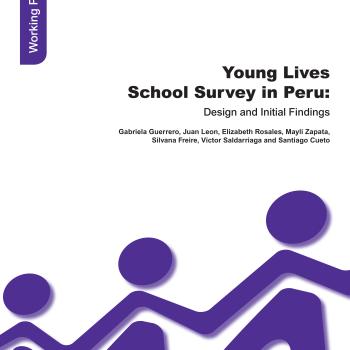
For a long time educational researchers have found that one of the main determinants of a child's educational success, if not the most important, is the socio-economic status of their family. For example, Young Lives research in Peru shows that by the time a child reaches his or her first birthday the family's 'wealth index' predicts the quality of their schooling as well as their academic achievement ten years on.
In a blog written for the Global Campaign for Education, Santiago draws on the Young Lives school survey in Peru to argue that need not lead to a pessimistic conclusion that poverty must be eliminated before educational results can improve. Our research in Peru and the other countries shows a wide variation in scores among children of similar levels of poverty. The explanation seems to lie in what resourceful teachers can do and that good teachers provide their students with more opportunities to learn.
Our conclusion is that we need better teacher training and in-service training and that textbook selection for schools need to set a higher standard for what students should know and be able to do. Peru's education policy is at a cross-roads. After achieving almost universal primary school enrolment and increasing enrolment for other levels, achieving acceptable levels of learning for all pupils should be the next priority. Otherwise the educational system will continue being beneficial only for the better-off few.
Reference
Young Lives School Survey in Peru Design and Initial Findings, Young Lives Working Paper 92, 2012

For a long time educational researchers have found that one of the main determinants of a child's educational success, if not the most important, is the socio-economic status of their family. For example, Young Lives research in Peru shows that by the time a child reaches his or her first birthday the family's 'wealth index' predicts the quality of their schooling as well as their academic achievement ten years on.
In a blog written for the Global Campaign for Education, Santiago draws on the Young Lives school survey in Peru to argue that need not lead to a pessimistic conclusion that poverty must be eliminated before educational results can improve. Our research in Peru and the other countries shows a wide variation in scores among children of similar levels of poverty. The explanation seems to lie in what resourceful teachers can do and that good teachers provide their students with more opportunities to learn.
Our conclusion is that we need better teacher training and in-service training and that textbook selection for schools need to set a higher standard for what students should know and be able to do. Peru's education policy is at a cross-roads. After achieving almost universal primary school enrolment and increasing enrolment for other levels, achieving acceptable levels of learning for all pupils should be the next priority. Otherwise the educational system will continue being beneficial only for the better-off few.
Reference
Young Lives School Survey in Peru Design and Initial Findings, Young Lives Working Paper 92, 2012

